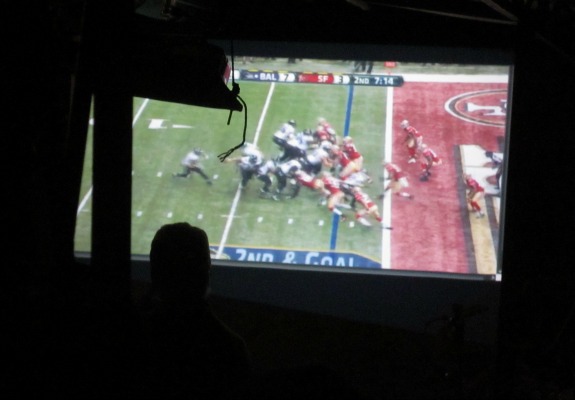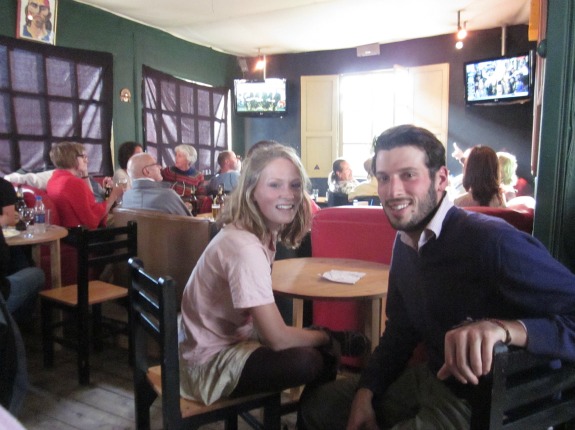Strange Ball in a Strange Place: Watching the Super Bowl in Ecuador
America’s Biggest Game brings excitement, curiosity and some boredom to Ecuador
![]()

The Ravens edge toward the end zone during Superbowl XLVII as gringo residents of Cuenca, Ecuador watch in the Inca Lounge and Bistro. Photo by Alastair Bland.
At the Inca Lounge and Bistro, dozens of gringos–tourists and resident expats both–have squeezed into this popular watering hole just off Calle Larga and overlooking the river. It is Super Bowl Sunday in Cuenca, Ecuador–and though the kickoff is still three hours away, owner Mike Sena must usher in his customers early and shut the doors. The sale of alcohol is highly restricted in Ecuador on Sundays, and so Sena, an American who moved here four years ago from New Mexico, is keeping a low profile this Super Bowl and designating the evening a “private party.”
Only a few Ecuadorians have shown. One, a 37-year-old gold mining engineer named Pablo Crespo, was a soccer fan all his life but learned to love (American) football–and the Ravens–during the eight years he lived in Baltimore. “American football is more interesting than soccer,” Crespo concedes. “Every play is different. The players have to be smart, too, and need to read the plays and know what the other team is going to do.”
Soccer, he adds, “can be a little boring.”
London travelers Solomon Slade and his girlfriend Rebecca Wyatt, who have spent the past eight months cycling through Trinidad, Venezuela, Colombia and Ecuador, are soccer fans and aren’t quite sure what to make of American football.
“Why do they need all the armor?” says Wyatt, 25. “Rugby players don’t wear protection.”
The two have claimed a table inside the bar and are prepared to spend the evening here, though they dread the prospect of a 60-minute game spread thin across more than three hours through timeouts and commercial breaks.
“American sports in general are hard to watch because they’re so stop-start,” Slade, 26, says.

Rebecca Wyatt and Solomon Slade, touring cyclists from London, wait in the Inca Lounge and Bistro in Cuenca, Ecuador for the Superbowl to begin. Photo by Alastair Bland.
Sena, pouring beers and mixing drinks behind the bar, says that football season generates a spike in his business here–largely from expat Americans but also among native Ecuadorians. He says interest in football among native Ecuadorians is growing in large part because many citizens here who worked in the United States before the economic crash have since returned home–and many of them as football fans.
But Pedro Molina, brewmaster at the nearby La Compañía Microcervecería, at the corner of Borrero and Vazquez streets, told me on Saturday evening that he sees virtually no interest in football among locals. His brewpub is closed on Sundays, and he said he had no plans to watch the game elsewhere–for, like most locals as well as hundreds of millions of people worldwide, Molina prefers the other kind of football.
“Soccer is the king of sports,” Morena said. “It’s a better game. It requires more technique and skill, because you can’t make physical contact.” It’s like a dance, he said–an almost nonstop, 45-minute dance–requiring agility, balance and fancy footwork. “How long is a game of American football?” Molina asked me.
Sixty minutes, I said, plus a couple of hours of breaks. Molina nodded, satisfied that he’d adequately assessed the two games–one a nimble sport of lithe, quick athletes, the other a brutish but slow battle of bellowing muscle-heads and lumbering jocks.
Earlier that same day I questioned three young men working out on the chin-up bars at the popular Parque Paraiso, on the north side of town. They said they knew about the Super Bowl but didn’t seem to think much of it and had no plans to watch the game. I asked which of the two sports–soccer or football–they thought was more challenging.
“American football,” Juan Merchan, 28, said. “It’s tougher on the body.”
But Merchan added that “futbol real” is more interesting to play and to watch since “it involves more improvisation and less plans.”
In the Inca bar, perhaps 200 people of every age category and many nations have crammed into the private party. Still, the Super Bowl has yet to begin. Elizabeth Eckholt, a San Francisco Bay Area native who has been in Ecuador for the past two weeks, says she is routing for the 49ers–though not passionately.
“I’m really here to see the commercials,” she says.
The game begins but plods forward slowly. Every few minutes, a break arrives and we are subjected to another series of ads for cars, beer and junk food.
“I can’t believe the unhealthy junk they advertise on this game,” says Wyatt, voice raised to be heard.
I have never spent six hours in a bar and I don’t plan to tonight. Last May, the Wall Street Journal‘s Bruce Orwall recognized the virtues of what he called “real football”, including soccer’s “subtle athletic grace, fierce national and regional rivalries and mercifully efficient, commercial-free matches.”
I, like him, I assume, am not entertained by Doritos and Calvin Klein ads. Okay–let Beyonce sing if she must, but this game should really be done by 8. I leave before half-time. In the United States, virtually every sports bar must now be crammed with football fans. But in Cuenca, beyond the Inca Lounge and Bistro, the Super Bowl may be happening but this world is not watching. The Sunday evening air of Cuenca is calm and still, the nation quiet on a day without drinks. In this land, soccer is the king of sports and athletes–not advertisers–kings of the airwaves. And for fans of futbol real, even after they watch a televised afternoon match, there may remain enough daylight to go play a game.
/https://tf-cmsv2-smithsonianmag-media.s3.amazonaws.com/accounts/headshot/Off-Road-alastair-bland-240.jpg)
/https://tf-cmsv2-smithsonianmag-media.s3.amazonaws.com/accounts/headshot/Off-Road-alastair-bland-240.jpg)